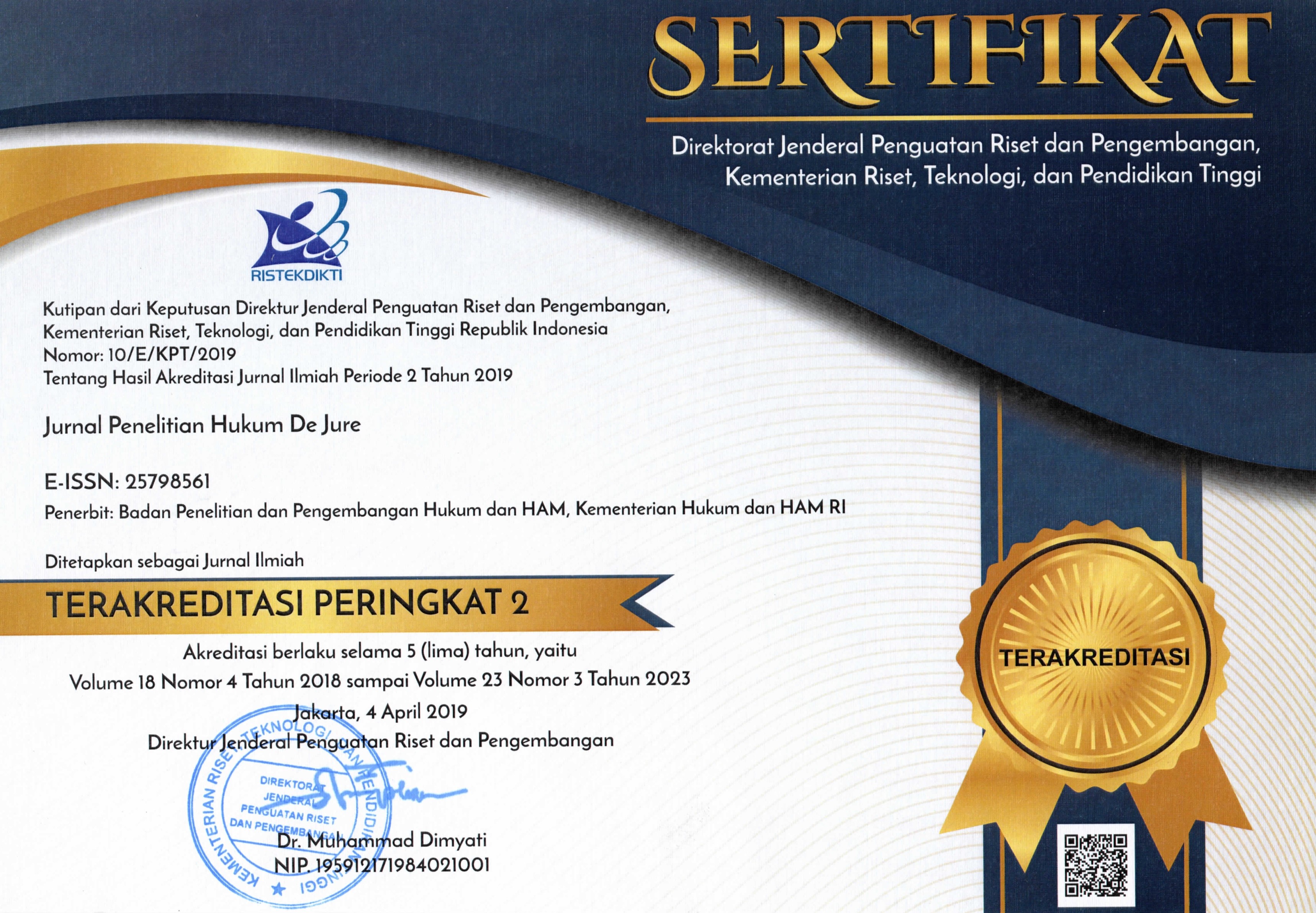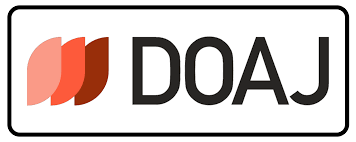Indonesian Law and Artificial Intelligence: Balancing Accountability, Ethics, and Innovation
Abstract
Artificial intelligence (AI), which includes computing for perception, cognition, and action, raises complicated legal issues. This research investigates AI’s influence and legal implications, focusing on its autonomy in communication and creativity, which raises problems about language, intellectual property, and ethical accountability. Discussions differ depending on whether they are influenced by the Common Law or Civil Law systems. While Common Law defines AI as “computer-generated work,” Civil Law tends to see AI as a legal thing. This research aims to formulate a solid ground for an AI legal framework in the Indonesian national legal system. The research undertaken involves a thorough analysis of academic literature, focusing on the legal and ethical implications of AI, highlighting the need for a nuanced perspective to define its subjectivity. In conclusion, the complex interplay between artificial intelligence (AI) and legal principles involves reframing old terminology. Existing models for AI duty are called into question, and vicarious liability is one possible answer. AI is a derived law problem, so it needs to be carefully calibrated
for responsible innovation while also keeping ethics and technological progress in check.
Keywords
Full Text:
PDFReferences
Adriano, Elvia Arcelia Quintana. “Natural Persons, Juridical Persons and Legal Personhood.” Mexican Law
Review 8 (July 2015): 101–18. https://doi.org/10.1016/j.mexlaw.2015.12.005.
Apeldoorn, L.J. Pengantar Ilmu Hukum. Translated by Sadino Oetarid. 10th ed. Djakarta: Pradnja Paramita, 1968.
Arifin, Saru. “Artificial Intelligence in the Workplace : How Should Moral and Legal Issues Be Addressed?” Pro
Publico Bono - Magyar Közigazgatás 9, no. 4 (2021): 94–109. https://doi.org/10.32575/ppb.2021.4.6.
Balkin, J. M. “Understanding Legal Understanding: The Legal Subject and the Problem of Legal Coherence.” The
Yale Law Journal 103, no. 1 (October 1993): 105. https://doi.org/10.2307/797078.
Cao, Zheng. “Development and Application of Artificial Intelligence.” In Proceedings of the 2nd International
Conference on Mechatronics Engineering and Information Technology (ICMEIT 2017). Dalian, China:
Atlantis Press, 2017. https://doi.org/10.2991/icmeit-17.2017.79.
“Copyrights Act,” 1988. https://www.legislation.gov.uk/ukpga/1988/48/contents.
Dianto, Dianto. “Study Von Savigny’s Thinking About Morals in Law: Understanding Moral in the Concept of
Law “Barenti Lako Syara’ Tradition, Syara Barenti Lako Kitabullah”.” Journal of Transcendental Law 2,
no. 1 (August 11, 2020): 1–10. https://doi.org/10.23917/jtl.v2i1.11247.
Dictionary, Cambridge. “Computer-Generated.” Cambridge English Dictionary. Accessed June 9, 2023. https://
dictionary.cambridge.org/us/dictionary/english/computer-generated.
Drummond, Tim. “Understanding Copyright and Fair Use in the Music Classroom.” Music Educators Journal
, no. 2 (December 2015): 48–53. https://doi.org/10.1177/0027432115611233.
Egger, John Okley, and D. Gregory Springer. “Music Educators’ Understanding and Opinions of U.S. Copyright
Law.” Update: Applications of Research in Music Education 37, no. 3 (June 2019): 20–27. https://doi.
org/10.1177/8755123318801064.
encyclopedia.com. “Volksgeist.” Accessed February 13, 2024. https://www.encyclopedia.com/history/dictionariesthesauruses-
pictures-and-press-releases/volksgeist.
Johnson, Marina, Abdullah Albizri, Antoine Harfouche, and Samuel Fosso-Wamba. “Integrating Human
Knowledge into Artificial Intelligence for Complex and Ill-Structured Problems: Informed Artificial
Intelligence.” International Journal of Information Management 64 (June 2022): 102479. https://doi.
org/10.1016/j.ijinfomgt.2022.102479.
Kahr, Patricia K., Gerrit Rooks, Martijn C. Willemsen, and Chris C. P. Snijders. “It Seems Smart, but It Acts
Stupid: Development of Trust in AI Advice in a Repeated Legal Decision-Making Task.” In Proceedings
of the 28th International Conference on Intelligent User Interfaces, 528–39. ACM, 2023. https://doi.
org/10.1145/3581641.3584058.
Kamyshanskiy, Vladimir, Dmitry Stepanov, Irina Mukhina, and Dina Kripakova. “Digital Society, Artificial
Intelligence and Modern Civil Law: Challenges and Perspectives.” SHS Web of Conferences 109 (May
: 01016. https://doi.org/10.1051/shsconf/202110901016.
Khullar, Vikas, Vrajesh Sharma, Mohit Angurala, and Nipun Chhabra. Artificial Intelligence and Society 5.0:
Issues, Opportunities, and Challenges. Boca Raton: Chapman & Hall, 2023.
Kodilinye, Gilbert, and Natalie Corthesy. “Vicarious Liability.” In Commonwealth Caribbean Tort Law, 362–406.
Routledge, 2022.
Liu, Shuai. “‘‘IoT Plus” and Intelligent Sports System Under the Background of Artificial Intelligence -- Take
Swimming as an Example.” In Big Data Analytics for Cyber-Physical System in Smart City, edited by
Mohammed Atiquzzaman, Neil Yen, and Zheng Xu, 1303:195–201. Advances in Intelligent Systems and
Computing. Singapore: Springer Singapore, 2021. https://doi.org/10.1007/978-981-33-4572-0_28.
Ma, Chao. “Generated Artificial General Intelligence: The Philosophical Principle of Artificial General Intelligence
and Give an Example,” July 25, 2022. https://doi.org/10.14293/S2199-1006.1.SOR-.PPH6XZB.v2.
Martsenko, Nataliia. “Określenie Miejsca Sztucznej Inteligencji w Prawie Cywilnym.” Studia Prawnoustrojowe,
no. 47 (March 2020). https://doi.org/10.31648/sp.5279.
Muller, S. Marek. “Monkey Business in a Kangaroo Court: Reimagining Naruto v. Slater as a Litigious
Event.” Rhetoric and Public Affairs 25, no. 1 (March 1, 2022): 31–59. https://doi.org/10.14321/
rhetpublaffa.25.1.0031.
Naruto v. Slater No. 16-15469 (9th Cir. 2018) (n.d.).
Paton, George Whitecross, and David Plumley Derham. A Textbook of Jurisprudence. 4th ed. New York: Oxford
University Press, 1972.
Prianto, Yuwono, Viony Kresna Sumantri, and Paksi Yudha Sasmita. “Pros and Cons of AI Robot as a Legal Subject.”
In Proceedings of the Tarumanagara International Conference on the Applications of Social Sciences and
Humanities (TICASH 2019). Atlantis Press, 2020. https://doi.org/10.2991/assehr.k.200515.067.
Quintavalla, Alberto, and Jeroen Temperman, eds. Artificial Intelligence and Human Rights. First Edition. Oxford,
United Kingdom ; New York, NY: Oxford University Press, 2023.
Sheikh, Haroon, Corien Prins, and Erik Schrijvers. Artificial Intelligence: Definition and Background. Springer
International Publishing, 2023. https://doi.org/10.1007/978-3-031-21448-6_2.
Sun, Yuang. “AI Works Protected by the Laws of the International Situation and Enlightenment.” In Advances
in Social Science, Education and Humanities Research. Atlantis Press, 2021. https://doi.org/10.2991/
assehr.k.210519.166.
“Thaler v Comptroller General of Patents Trade Marks and Designs, [2021] EWCA Civ 1374,” 2021.
Winston, Patrick Henry. Artificial Intelligence. Addison-Wesley, 1992.
Xie, Wangsong. “The Development of Financial Intelligence Driven by Financial Technology in the Background of
Artificial Intelligence.” In 2020 International Conference on Data Processing Techniques and Applications
for Cyber-Physical Systems, edited by Chuanchao Huang, Yu-Wei Chan, and Neil Yen, 1379:331–38.
Advances in Intelligent Systems and Computing. Singapore: Springer Singapore, 2021. https://doi.
org/10.1007/978-981-16-1726-3_41.
York, University of. “AI-Generated Music Inferior to Human-Composed Works, According to Study.” York.
Ac.Uk, 2023. https://www.york.ac.uk/news-and-events/news/2023/research/ai-generated-music-inferiorto-
human-composed/.
Yu, Kaijun, Ruiyi Gong, Longjie Sun, and Chunguo Jiang. “The Application of Artificial Intelligence in Smart
Library.” In Proceedings of the 2019 International Conference on Organizational Innovation (ICOI 2019).
Ulsan, South Korea: Atlantis Press, 2019. https://doi.org/10.2991/icoi-19.2019.124.
Article Metric
Abstract this article has been read : 211 timesPDF file viewed/downloaded : 165 times
DOI: http://dx.doi.org/10.30641/dejure.2024.V24.121-132
Refbacks
- There are currently no refbacks.
Copyright (c) 2024 Rangga Hotman Hasibuan, Aurelya Jessica Rawung, Fidel Jeremy Wowiling

This work is licensed under a Creative Commons Attribution-NonCommercial 4.0 International License.
Jurnal Penelitian Hukum De Jure Indexed by :












